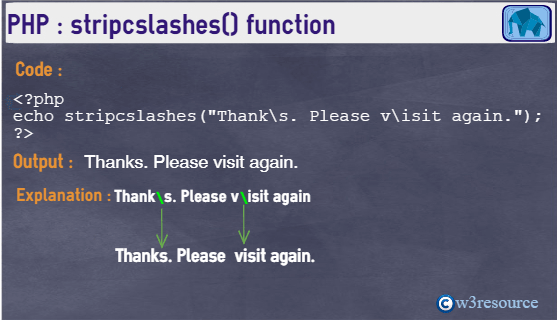PHP : stripcslashes() function
PHP: Un-quote string quoted with slashes in a C style
The stripcslashes() function is used to remove backslashes added by the addslashes() function.
Version:
(PHP 4 and above)
Syntax:
stripcslashes(string1)
Parameter:
| Name | Description | Required / Optional |
Type |
|---|---|---|---|
| string1 | The string to be unescaped. | Required | String. |
Return value:
The unescaped string.
Value Type: String.
Pictorial Presentation

Example:
<?php
echo stripcslashes("Thank\s. Please v\isit again.");
?>
Output:
Thanks. Please visit again.
View the example in the browser
See also
Previous: strip_tags
Next: stripos
